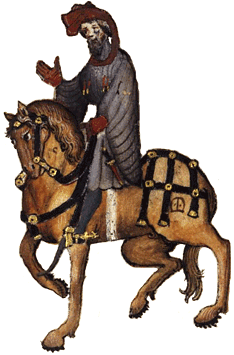|
|
|
|

| to Chaucer's Knight |



Audio Reading by Anniina Jokinen, ©2006.
Anniina studied Chaucer at UCLA under V. A. Kolve.
For the direct .MP3 file, click here.
|
A KNYGHT ther was and that a worthy man,
That fro the tyme that he first bigan
To riden out, he loved chivalrie,
Trouthe and honour, fredom and curteisie.
Ful worthy was he in his lordes werre,
And therto hadde he riden, no man ferre,
As wel in cristendom as in hethenesse,
And evere honoured for his worthynesse.
At Alisaundre he was whan it was wonne;
Ful ofte tyme he hadde the bord bigonne
Aboven alle nacïons in Pruce;
In Lettow hadde he reysed and in Ruce,—
No cristen man so ofte of his degree.
In Gernade at the seege eek hadde he be
Of Algezir, and riden in Belmarye.
At Lyeys was he and at Satalye,
Whan they were wonne; and in the Grete See
At many a noble armee hadde he be.
At mortal batailles hadde he been fiftene,
And foughten for oure feith at Tramyssene
In lystes thries, and ay slayn his foo.
This ilke worthy knyght hadde been also
Somtyme with the lord of Palatye
Agayn another hethen in Turkye;
And everemoore he hadde a sovereyn prys.
And though that he were worthy, he was wys,
And of his port as meeke as is a mayde.
He nevere yet no vileynye ne sayde,
In al his lyf, unto no maner wight.
He was a verray, parfit, gentil knyght.
But, for to tellen yow of his array,
His hors weren goode, but he ne was nat gay ;
Of fustian he wered a gypon
Ál bismótered with his habergeon,
For he was late y-come from his viage,
And wente for to doon his pilgrymage.
|
45
50
55
60
65
70
75
|
51. Alisaundre, Alexandria, taken by Pierre de Lusignan in 1365.
52. the bord bigonne, taken the head of the table.
53. Pruce, Prussia, i.e. in company with the Teutonic Knights.
54. Lettow, Lithuania.
reysed, raided.
Ruce, Russia.
56. Gernade, Granada. Algezir and (Algeciras) were taken from the Moors in 1344.
Belmarye, Benmarin, a Moorish kingdom in N. Africa.
58. Lyeys, in Armenia, taken from the Turks 1367.
Satalye, Attalia, taken from Turks 1361.
59. the Grete See, the Mediterranean.
60. armee, an expedition, either by sea or land;
aryve, a disembarkation.
62. Tramyssene, Tremezen, adjacent and subject to Benmarin.
65. Palatye, a Christian lordship in Anatolia.
67. prys, price, esteem.
74. hors can be plural as well as singular, and if plural may include the horses
of the Squire and Yeoman. In any case he refers to the Knight.
75. gypon, short vest.
76. habergeon, coat of mail. In scanning this line, stress must be laid on the first word,
which serves for a whole foot.
Source:
Pollard, Alfred W., ed. Chaucer's Canterbury Tales. Vol I.
London: Macmillan and Co., Ltd., 1907. 3-4.
 |
to Chaucer's Knight |

|
to the Canterbury Tales
|
 |
to the Works of Geoffrey Chaucer |
Copyright ©1996-2023 Anniina Jokinen. All Rights Reserved.
Created on October 29, 1998 by Anniina Jokinen. Last updated on February 3, 2023.
|
|
|